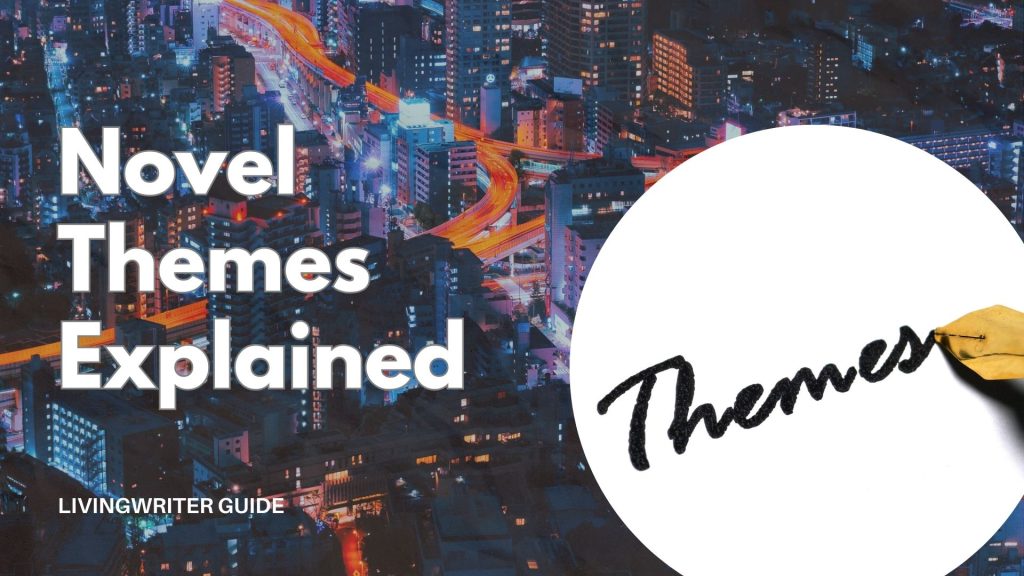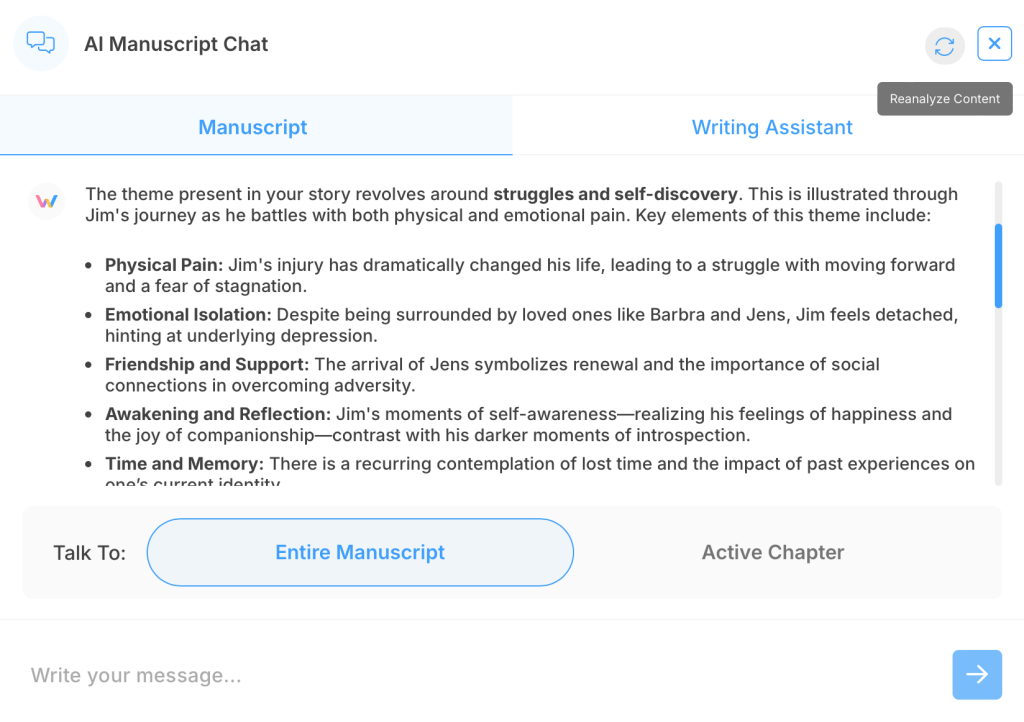What Is Theme In A Story – 8 Mistakes To Avoid

Theme is important for a novel, but it is a somewhat vague and misunderstood concept. Without a theme, your novel may feel flat or thin, even if the plot is good. A Theme takes good books and makes them great. Today, I’ll cover what a theme is in a story, things people do wrong, advice on how to find your theme, and much more. So, without further ado, let’s jump in.
Table Of Contents
What Is Theme In A Story?
First things first – What is theme in a story? A theme in a story is the underlying message, or idea, that you explore throughout the work. Whatever you’re writing about is your subject or topic (the what), and the theme is what you say, ask, or ponder, about or through that topic.
For example, All Quiet on the Western Front is about war. That’s the topic. The theme is the brutality of warfare and the loss of innocence experienced by young soldiers. Starship Troopers (the novel) is also about war. But the theme focuses on the necessity of military service for societal stability, and the idea that violence is a fundamental tool for resolving conflict.
How To Find The Theme Of Your Story
Discovering the naturally underlying message or theme of your novel isn’t always a straightforward process. This is partly because the theme can (and often, should) evolve throughout your writing. So, don’t feel pressured to pinpoint your theme on page one.
Oftentimes, the theme emerges from the work (characters, plot, etc). So, as you write, pay attention to any recurring ideas, questions or conflicts about the human condition or society that arise from your topic and the story you’re telling.
Your theme might not be a definitive statement you consciously set out to prove, and that’s ok. As we’ll cover below, it can be a subtle thing that you moreso, explore with your narrative. That said, just being aware and open to the possibilities the deeper meaning of your story will often surface (to some degree) through the act of writing itself.
A bonus tip is to write the book and get people to read it. Then, ask them what it’s about in terms of underlying messages, themes, and concepts. This is a great way to get a feel for whatever themes may be naturally occurring in your novel. Once you start to find the themes in your draft, you edit and shape the work accordingly.
How To Do Theme In A Story – Mistakes To Avoid
Theme is one of those elusive literary concepts that you hear about but that rarely gets dove into deeply. And it’s easy to see why. Usually we don’t sit down and read a novel for the theme – It’s the plot, the conflict, and the characters we love. When done well, it might not even be obvious just how much the theme added to the story but without it, the story (even the good parts) would suffer.
You May Also Like: Tension In Writing – A Complete 2025 Guide
Much like you don’t eat delicious food and credit the oil, salt, and pepper for the dish. You may not even specifically taste them. However, if they’d be left out, you certainly notice. Theme, is the secret ingredient that brings everything else in a story together and adds some unique flavor.
Now that we know what theme is in a story, why it’s important, and how to find the theme in your story, let’s get into eight common mistakes that you should watch out for.
1. Topic = Theme
As mentioned, theme and topic are not the same. The topic is what the book is about—for example, love or revenge. The theme, however, is a sentence that shows what you have to say about your topic, such as “Love can conquer even the greatest obstacles” or “Revenge ultimately consumes the seeker.”
keep this distinction in mind as you write and be sure you’re conscious about the ideas and concepts that you want to be exploring with your topic and plot.
2. You Need The Theme At The Start
It’s ok to find your theme as you write. Let it develop organically and naturally as you explore your story and characters, and then consciously work it in during the editing process to ensure it resonates throughout. Don’t feel pressured to define it perfectly before you begin writing.
3. Starting The Theme To Harshly
The theme does matter, but you usually shouldn’t just lecture and spell out your theme bluntly within the narrative. Like I said above, theme is like the seasoning in a dish, and you can certainly over do it. Instead of screaming the theme in the reader’s face try to communicate it subtly through the unfolding plot, character arcs, and symbolic elements of your story. In other words, show, don’t tell, your theme.
4. A Theme Should Be Concrete
It’s ok for the theme to be multifaceted, in a gray area, or a question instead of a definitive stance. Themes often use multiple POVs on a central idea without one being definitively “right.” Say our story is about two teens in extreme poverty, who become desperate and rob a bank.
From the perspective of the starving, stealing probably isn’t morally wrong. And even if it is, we as the reader will understand. But from the POV of the law, or someone inside the bank (especially if someone gets hurt) our “protagonists” are the bad guys.
You May Also Like: How To Create Fictional Characters: Best 3-Step Method
5. Theme = Protagonist’s Thoughts
The theme doesn’t have to be what your protagonist thinks or believes. This is especially true if they are flawed or evolving the way they act/think through the story, which they should be! It’s perfectly acceptable for them to be in opposition of the theme or have a warped worldview. And again, POV matters.
As the story unfolds, a character may see things differently than they did at the start. This is a strong sign you’ve got an arc for that character, which is good. But still, they don’t always have to start (or end up) validating the theme simply because they’re the protagonist.
6. You Need Multiple Themes
If you try to explore too many themes, it may dilute the impact and clarity of your central message. While some sub-themes can add depth, focusing on one primary theme will often create a more cohesive and powerful narrative. While longer works might successfully weave in a few interconnected ideas, in general, you want a single theme.
7. Changing Themes Halfway Through
Once you’re in the final draft stages of your novel, make absolutely sure you don’t inadvertently switch themes halfway through. If you’re not careful, it’s easy to do and leads to a disjointed and confusing reading experience.
8. Resolution Repeats The Theme
The resolution of your novel doesn’t have to definitively “end” the exploration of the theme or provide a final answer. It’s perfectly acceptable for the theme to evolve, expand upon previous ideas, or even be left open-ended, prompting further thought and discussion from the reader.
Better Themes With LivingWriter
LivingWriter helps you reach your full potential as a writer and has been voted the best writing app of 2025 – From story outlines to more unique characters, LivingWriter can improve many aspects of your writing, including theme.
With the advanced, writer specific, AI chat features, you can get perspective or tailored advice on your story. It can answer theoretical questions about your plot or characters, research-based questions, how to induce a certain feeling into a passage, and theme.
Below I asked what, if any, theme was naturally coming through in my story. Since the AI is integrated, all of the advice is tailored to this specific story. Here is the feedback on the themes coming across in my story.

It would end by offering this as the final thought on the overall theme – “Through these elements, the narrative conveys a poignant exploration of the complexities of life, the impact of relationships, and the enduring quest for self-fulfillment despite hardship.” This feedback is for my short story Back in the High Life Again, and was very helpful to hear.
Not only did it help me find my naturally occurring story theme, it helped me avoid some of the mistakes mentioned above. With a finger on what my story was saying about my topic, I was able to make the absolutely make the most of it, while staying subtle. With LivingWriter, I was able to write my most thematic story to date. Read it (the link above is to a PDF) and you’ll see what I mean.
And best of all, it didn’t do any writing for me. From AI features like the chat to Chapter To Screenplay Conversion and Outline Help, LivingWriter gives you the tools to do your best work without doing it for you.
Conclusion
There you have it, my friends, everything you need to know about theme in stories. It’s more abstract than good characters, plot, conflict, pacing, etc but it’s no less important to a great story. Whether you’re starting a new story or finishing an old one, give some thought to the theme. You won’t be sorry.